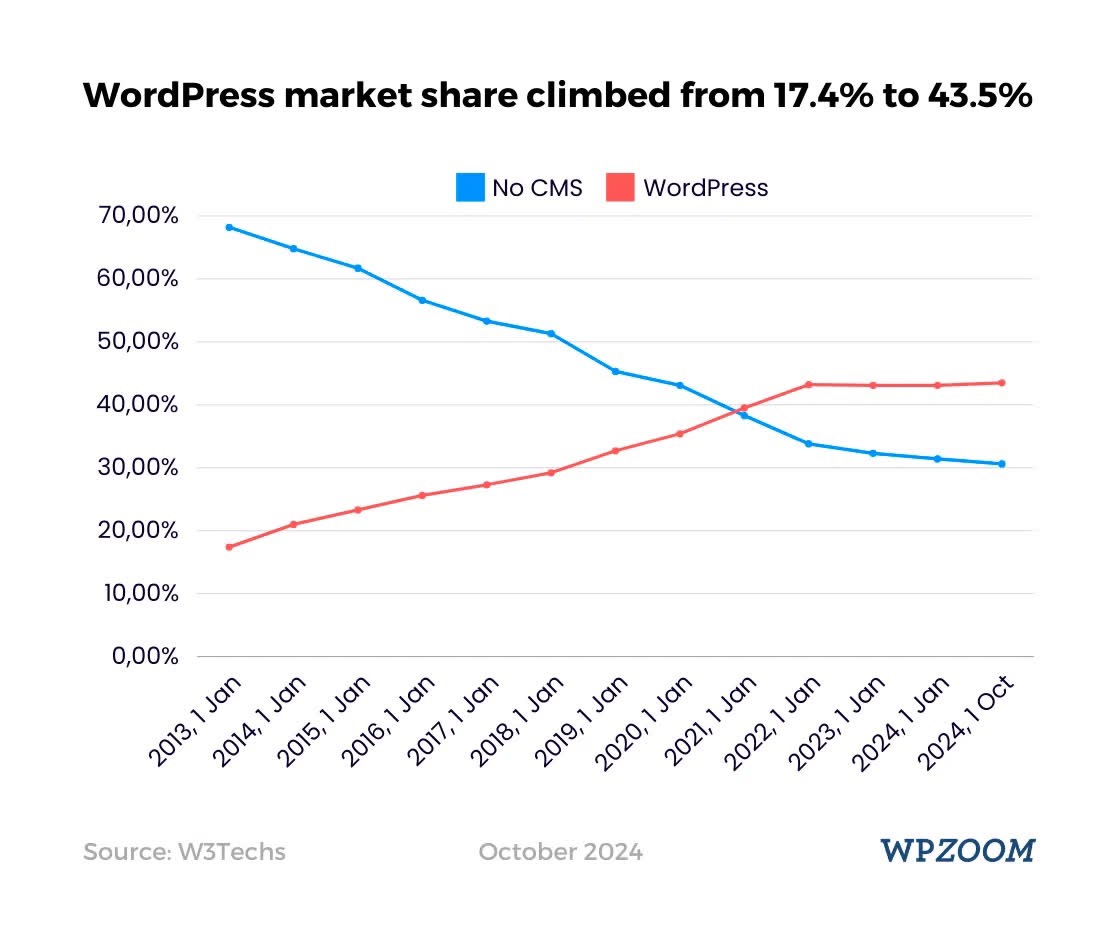WordPress Doesn't Matter for the Future of Web
WordPress won the market but the entire paradigm shifted to managed solutions like Webflow. Markets that aren’t growing become a zero-sum game, which probably caused the conflict in the first place.

In case you haven’t been following, there’s a huge drama in the WordPress community. Matt Mullenweg, the creator of WordPress, launched a crusade against WP Engine, a company selling managed WordPress hosting and the competitor of his own entities. You can catch up on the story here.
But the funniest part of this WordPress drama is that WordPress is irrelevant.
Yes, it still powers around 40% of websites. But it’s not the future of the web. You *can* be both big and irrelevant. IBM created PCs as we know them and is currently worth $214Bn, yet nobody cares much about them. In fact, this scandal is probably the most attention WordPress received from the public in the last few years.

WordPress usage has plateaued. It’s not going to die (although Matt is surely trying a lot), but it’s unlikely to grow. Unfortunately, this is exactly when people realize it’s all a zero-sum game, and the fighting starts. Automattic probably believes that taking users away from WP Engine is a more reliable growth channel than trying to acquire new ones.
Technology products don’t get replaced by new, slightly better products. More often than not, they’re replaced by a completely different paradigm that makes certain use cases and applications radically simpler while throwing away aspects previously deemed important.
Back in the day, there were countless content management systems (CMS). PHP Nuke and its countless forks, Drupal, Joomla, and many others. As an aspiring developer, I coded my own (but I had no idea how to make other people use it). WordPress did actually win. But then WordPress wasn’t replaced by an improved WordPress. Instead, fully managed proprietary solutions took over.
You want to sell things online? Shopify. You need a landing page? Webflow or Squarespace. You want a blog? Substack or Beehiiv.
Yes, there are downsides. You’re locked in, and you might have to pay fees on your revenue. These platforms are less customizable, and the lock-in enables them to raise prices over time.
But they are also dramatically easier to launch and operate. Doesn’t matter if you’re an individual or a small business, the ability to start with a template and edit things without coding experience is amazing.
So, who uses WordPress? Organizations that prefer to host things themselves. There’s an army of WordPress developers and agencies who can build anything for them, and that alone creates the demand. If you want to self-host, there are no comparable solutions out there, exactly because people rarely develop for the outdated paradigm. People don’t trust WordPress the project and are asking around what are the possible alternatives with the same philosophy. There are practically none. One exception is Ghost, which is an open-source blog engine. But even Ghost moved toward a far more lucrative space of newsletters and paid communities, and it’s not a fully-fledged competitor to WordPress.
At my previous job, we had an agency build us a website on WordPress. And while we could edit texts on the landing page and add logos and news entries, adjusting anything else was near impossible. My current company has a Webflow website, and I have already rebuilt half of it and added an entire blog. We pay $340 annually for that privilege. Frankly, not much more expensive than premium WordPress hosters.
I know serious tech companies with complex software products and an army of developers who use Webflow for their landing pages. This way, they can keep developers focused on their actual product and let marketers and designers edit the pages as much as they need to.




